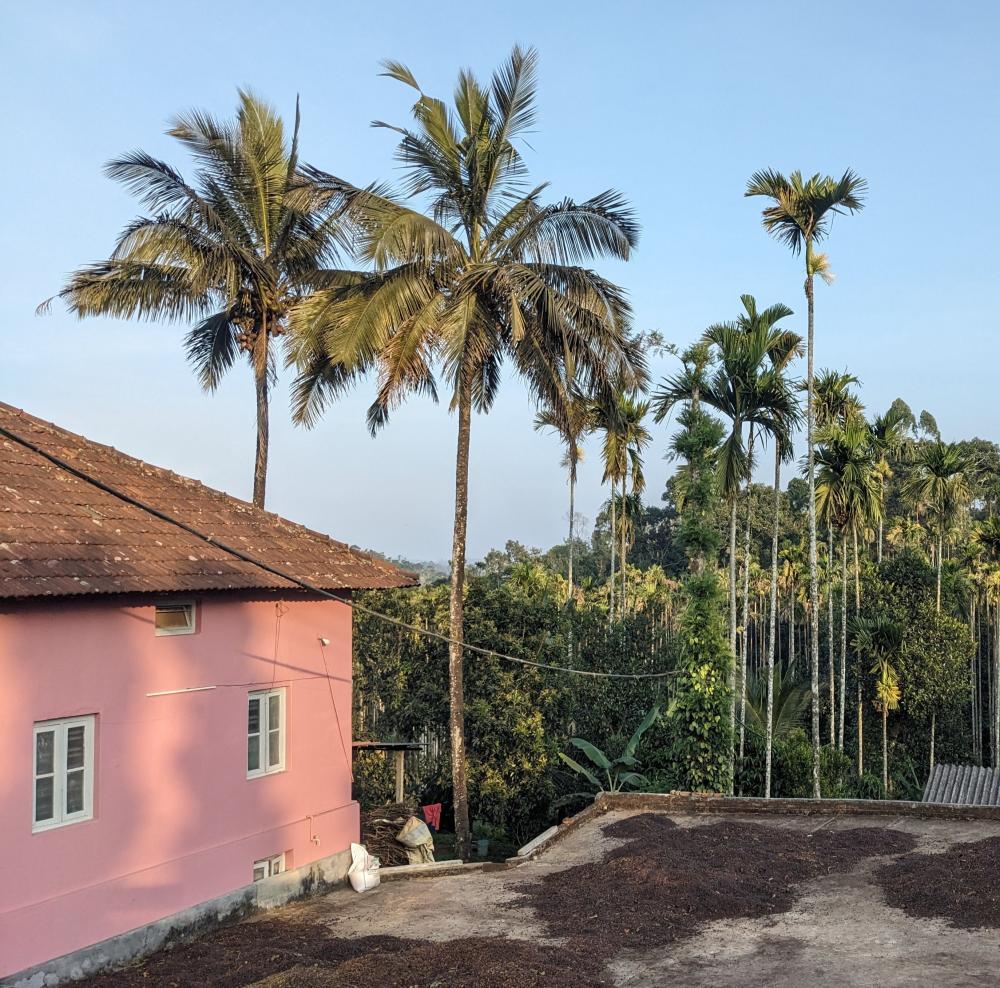Sitting on this makeshift work desk (that’s actually a couch) on the ground floor of a home in Chitragiri village in Wayanad is a blessing. Maybe the Christian family who owns the place might say that Christ has bestowed this blessing upon us. A big white church stands on the opposite side of the road. It is called Saint George Church Chitragiri, if I am not wrong. Its large but narrow white facade bolts upright while the rest of the church sprawls behind. A tea plantation lies next door to the church.
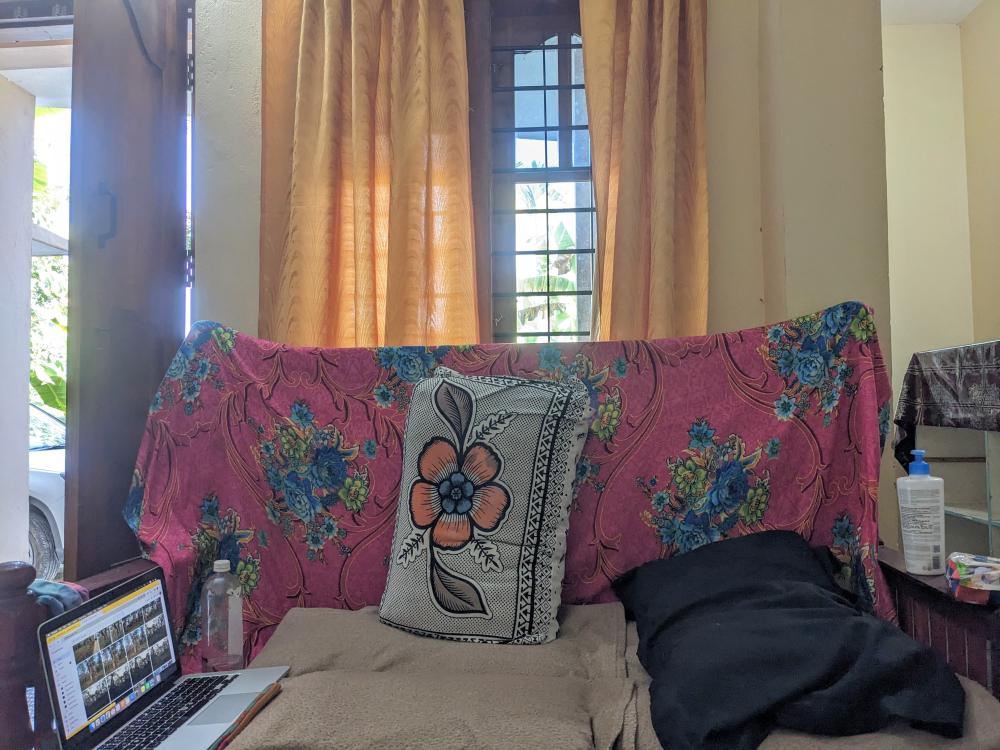
In our house, this house, or I must say, this building, the owner’s family stays upstairs. I guess they have more guest rooms on the second floor. Behind our house, which has two rooms, a hall, a kitchen, two bathrooms, more common area, is the dormitory which is unoccupied at the moment. The coffee and betel nut estate of the family is behind the building. Our porch leads onto the cement driveway which fronts the green estate.
Here downstairs we are, our doors open to the lushness of this coffee district.
We have spent three nights in this home. Today is our fourth day.
Getting to the House in Wayanad Village and Overjoyed to Find a Stove: Pains and Privileges of Itinerant Life
On the first day, we arrived close to five pm. That day we checked out at 3 pm from a lake-fronting stilt hut in another nearby Wayanad village home (a post coming soon). We didn’t have any plans or bookings. I had asked the hosts if we could stay another day, but the son of the family told me the huts were booked.
Another resort nearby was sold out, and many other places we checked online were all reserved for at least two days. It was the Republic Day extended weekend. We were on Friday, and the crowd coming in from Bangalore had filled Wayanad’s accommodations. All guesthouses, homestays, resorts with pools, cottages, hotels, and so on.
My partner and I have been traveling indefinitely in our car for three years but we still don’t anticipate full occupancy on public holidays and festivals. So unaware, we checked out on the 26th itself when everyone was coming in.
As we drove out of homestay street and onto a fork in the road, we looked at each other, our eyes questioning: in which direction to go? Much like the time when we had left the Wayanad Wildlife Sanctuary forest rest house and didn’t know where to go. That afternoon, we found the wooden stilt cottages on Google Maps. The huts worked out but instead of “let’s always leave with a booking” the lesson we learnt was “we can find places on the go.”
Travel serendipity had saved us in Himachal and many other times as well.
As my partner stopped the car at the fork, I looked at the stay options in both directions on Google Maps—the modern traveler’s best friend. To my right, beyond the Wayanad Palace Hotel where I might have enjoyed my life’s best crunchy prawn biriyani, the accommodations seemed fancy, well-marked, and well-described.
“Let’s not take this right. We go ahead.” So many years without a home had taught me that properly-reviewed places would be sold out on a three-day holiday.
As we went, I made a few calls. Everything was unavailable until Monday.
We parked the car and searched online but both of us individually could not find a guesthouse even after an hour. Unavailable, expensive, noisy, and so on. One or two people were offering their last room for three thousand, next to other rooms where bachelor boys: notorious for noise had already checked in. Another host had a home with a kitchen: raising my heartbeat for we hadn’t had a kitchen for two months. But the tariff was above three thousand and the hosts: an old couple sounded complex.
We were both getting hungry and sleepy now. My partner was worried, his brows raised and his cheeks tensed.
He was on the wheel. I decided to take control of the situation.
“Why are you worried? This is not the first time we don’t have a place. Let’s enjoy the road. We’ll find something to stay. We just need a place to sleep, nothing else. Can find it even by 9 pm. We’re in our car. What’s to worry about? Can you stop being tensed, and we’ll first have coffee and food and then we’ll drive on and we’ll see. Have fun with me?” I said to him.
He listened and relaxed enough for me to see he had. I played one of my usual road trip playlists and laid back in the seat.
After driving a bit, we crossed a homestay. We took a U-turn to read the contact number on the plate. We called. It was fully booked for two nights. Then we drove further on through a little dusty hot town. Its main market and its little shops fringed us on both sides, flaunting many hotels and rooms for 999 rupees per night.
After the huts which were surrounded by a little forest and two natural lakes, this town would have been a disaster. At least we won’t have to sleep on the road if we don’t find anything else.
A kilometre and a half or so later on the highway, a placard outside a home on our left caught our attention. “Bachelor family rejoice concept”—it said something along the lines. Rooms, bathroom, hot water, kitchen facilities, self-cooking, parking, television, and so on were mentioned. I looked around. A white church and a tea estate were on our right. Ahead on our left were betel nut plantations and homes. We had just crossed small shops, a bus stand, and an automobile centre some five hundred metres behind us. We had passed a church as well. It seemed to be a village.
The option of cooking sounded too good to be true. Our previous experiences in homestays and hotels in India have taught us that self-cooking options come with conditions. No utensils, dirty space, tiny induction but no cooking pots, rusted pans, missing gas cylinder, and so on.
Beggars can’t be choosers. My partner stopped the car, and we dialled the number on the sign. No reply. We called a few more times. No answer. We looked at each other. Both of us—tired of finding homes and rooms every day, hoping to bring our trip to a pause—looked at each other. We sighed.
Enough times, storm clouds have parted from above us to throw on us some sunshine. Until the last moment, we need to hope against all odds.
It isn’t lost until it’s over.
We parked our car and walked in through the big open gate. A man in the ubiquitous Kerala mundu, a lungi essentially, and a thin, dark girl were carrying a heavy sack in the courtyard, ready to put something out in the sun. We both asked, “Homestay?” and pointed towards the notice. The old man immediately called us, repeated “home stay home stay,” ushered us further into the yard, rushed about, looked for keys while gesticulating heavily and saying, “keys, keys,” and asked and gesticulated to a woman in a gown to show us the rooms. Then he made a pantomime of showing us how to reach the car parking—we still hadn’t seen the place, motioning towards the backside where the betel nut plants rose thin and tall, down a slope, and so on.
The woman in the nightgown who had to leave whatever she was doing, looked at me up and down, didn’t smile back at me, and took us down a staircase. Is she wondering if we are married?
When the man had signaled around so haphazardly and vehemently, I had made up my mind. This place won’t work out and let’s just see it for we can’t back out now. My partner and I had said this to each other without saying anything.
The woman with her hair in a bun at the base of her sweaty neck opened the door. First, the yellow-walled hall came into view. There were three beds in it: two smaller than queen-size and a single bed. One queen bed was covered with a bright orange sheet, and the smaller one with a shining velvety green sheet. A simple wooden sofa—that is my desk now—was kept on one side under the wall. The floor was covered with cloth mats and one green grassy rough mat. After taking off our slippers—which is what my partner and I do less out of respect and more out of not wanting to dirty our own could-be home—we stepped on the plastic grass mat and entered the room on our right. It had two curtained windows, peach walls, a double bed covered with a yellow velvety sheet, a plastic chair laden with blankets, a cabinet with more blankets and pillows—nothing looked clean though and either had not been washed or if washed, must have been lying about in the same state for a while.
Inside the dark bathroom, a foul smell overtook us. Multiple used soaps lay on the washbasin. The window was covered by a bright orange homemade cloth curtain. We turned on the lights with some difficulty. A bucket and mug lay in one corner. The floor was stained red, and the toilet was a bit grimy. Both of our faces dropped.
We cringed our noses and asked about the smell by gesturing. The grey-haired woman understood and spoke in Malayalam and motioned with her hands to say the bathroom smelled because it had been closed.
Then she took us into the common bathroom of the house across the hall and next to the other room. This bathroom had water seeping in through the walls, and the paint was coming off in patches, some already on the floor and some hanging loose ready to drop any minute. This one didn’t smell but looked worse. The stained washbasin right outside the bathroom had an old soap, perhaps left on it in remembrance of the past guests.
The fairly well-built woman was now smiling in between. That was good. Her smile was softening me too.
Unable to hold any longer, I asked, “Kitchen?”
She took me back through the hallway, past a long, wall-hugging cabinet covered with plastic and on which were left burnt matches, fresh match boxes, incense remains, ash, et cetera.
Passing that incense massacre I didn’t think we would arrive in a kitchen. Perhaps we were heading to a graveyard. Indeed we were in the kitchen. An oval-shaped large table with a blackish marble top. Big, a running marble slab, a big steel washbasin, an old-looking stove with a large cylinder, and a dusty induction on the side. A pile of utensils—a smoky black pot, a pan, a spherical water pot, and another flatter pan with a loose handle were piled on top of each other in a corner, as if on a strike from work. Above the stove, the three windows facing the green estate we had passed to get to the main door were shut tight. But there were windows indeed. A big cylinder too.
I didn’t believe anything would work. The woman picked up the lighter, switched on the gas burner, and clicked, clicked. No, nada.
“Maybe the lighter doesn’t work,” I said.
She shook her head and said, “illa,”—meaning no, not, and in this case—“you’re wrong,” as in the next click, the flame leapt up from the burner. My partner and I looked at each other, our faces ecstatic and our eyes saying, Great. Then she touched around the induction too, showing the different temperatures or something. I asked her if its utensils were there—not sure why because I’m a gas-stove loyal—and she said anything steel would work.
Just about now when the fleeting warmth from the stove had softened our hearts—a man, tall and dark, appeared in the house behind her and said, “Yes madam.” He looked like the one in control, or, at least, the one responsible for showing us all this.
“Are you the owner?” I asked. I don’t know why.
“My father is the owner, madam, and I’m his son. You can call me AB.” The balding man bowed a little, aware of his towering height over us not-so-little beings.
I asked AB about the bathroom smell, and he agreed with his mother. We asked about the cleanliness of sheets, towels, and blankets. He said, “Perfectly clean, madam.”
Aunty lifted the multiple layers of bedsheets on the bed, showing them off to us. Underneath the yellow one, one more, and then one more white cover over the mattress. The sparkling topmost layer was just the cover, I was told. I was impressed. I like the covers.
AB said, “Two thousand per night. I give twenty-four-hour check-in.”
It was almost five pm so we could stay until evening the next day. My partner and I had recently discovered 24-hour check-ins in Mysore, and we were excited by the idea. I asked AB if he could reduce the tariff. He said he couldn’t. Though I knew the sheets had been left in for a bit, I also knew that this house would work out amidst the dearth of places.
We asked for fresh blankets, for some liquid to be put in the toilets, and so on. He instructed his mother to do everything.
Good. We weren’t homeless anymore.
His mother—whom we were now calling Aunty—was quietly listening to all of this. Soon she disappeared back up the outdoor stairs from where we had come and brought in two light blankets and put a liquid in the bathrooms which even afterwards were still not so clean. I wasn’t expecting them to be cleaned. Upon asking for a pressure cooker, she disappeared again and brought a pressure cooker too. It had taken me some time to explain to her but she brought one big one down when she understood. Every time she went away, I was sure I would never see her again. But I was wrong each time. Once when I went out onto the cement driveway on which was now parked our car, her son was telling her to get plates, bowls, spoons, and a frying pan, and she was repeating. My partner may have asked for these things. Sometime later, she brought these items in their colors and varieties and while showing me a little wooden spatula, she smiled, albeit a little embarrassed with the tininess and singularity of that spatula. I laughed and said, “Yes and okay” to everything, ready to make do with whatever we were getting.
If the people are good—and they seemed good so far—we adjust. It’s even fun. The family’s chickens clucked and scratched in the yard. When I pointed to one and said, “Biryani,” Aunty laughed. Then she rambled on in Malayalam. We didn’t understand a word. The son had gone up by now. We all said things in our languages and laughed a bit more.
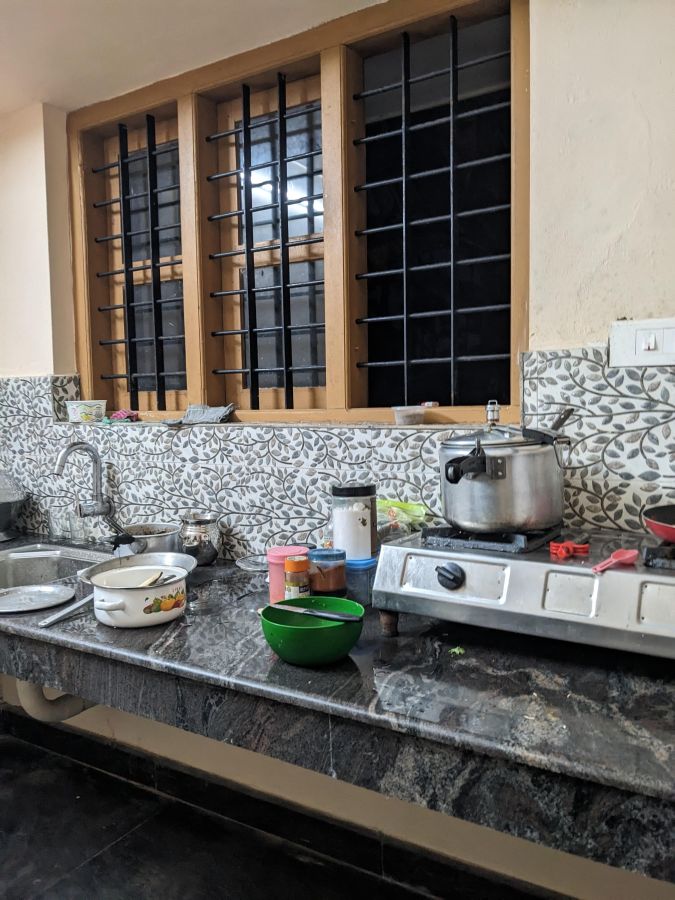
My partner and I brought out our food bags from the car, flung open the kitchen windows, cleaned the pan and dishes, and made two cups of tea and ajwain vermicelli which we devoured on the dining table. With steaming tea in our hand, we admired the square greenery (we were looking through the window) of the coffee, betel, and jackfruit estate right behind our house.
“It must be theirs,” we said to each other.
There was a knock at the door.
A girl, thin and dark and clad in a long skirt and blouse, with glossy, expressive eyes, stood at the door with some steel spatulas in her hand. Perhaps she was the one in the morning who had been lifting the sack with the house owner. Was she a hired worker or a family member? She leaned against the door, waiting to hand me the spatulas. Before I could take them from her, I was distracted by the cat behind her, who had perhaps followed her.
“Meow,” I said.
The cat meowed.
“She replied,” the girl said and smiled, her eyes shining and smile sparkling. Her glistening gaze was pure and intense. Who was she? She looked sweet, so simple, yet educated, English-speaking, and soft-spoken. I didn’t know then she was AB’s elder sister, the daughter of the house owner.
As expected, I would have a lot to think about and write about her in the next couple of days.
For now, we warriors were out to shop.
We weren’t expecting to get a kitchen so we didn’t have vegetables, or even tomatoes and onions. The idea of taking the car wasn’t entertained, and we both walked out with empty packs in our hands. Those stores that we had crossed on our drive didn’t seem so useful now. They didn’t have vegetables or anything else. We marched on and arrived in that dusty market whose ‘rooms for 999’ signs were now lit. At one vegetable shop, no one paid us any attention, and we stood on the side. We went to another shop which didn’t have much stuff. So we went back to the first one. Here some kind shoppers who knew Hindi and had come to work from Hindi-speaking parts of India helped us out. Without being asked, they picked up what we needed, weighed it, told us the price, and helped the shopkeeper to put it all together and tell us the cost. We bought capsicum and onions, potatoes, and bananas. Everything was a little wrinkly but would do.
With the heavy packs dangling from our hands, we walked back home. It would not have been such a bad idea to take the car given we were so tired. I didn’t share my thoughts with my partner who had suggested driving.
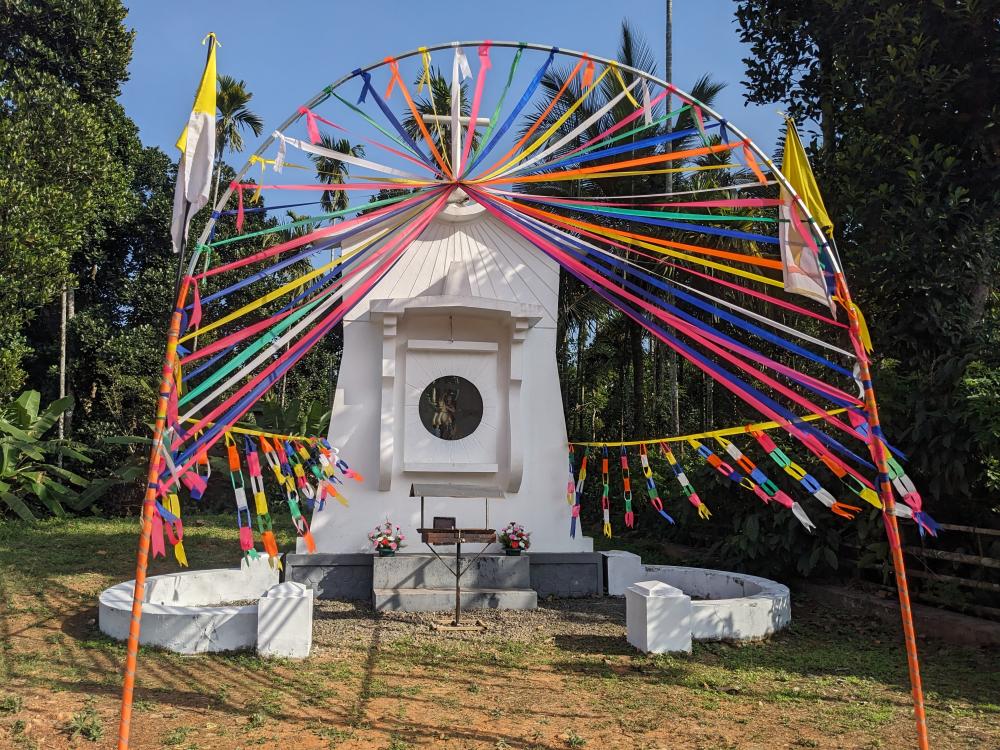
When it was time for dinner and—we were sure we had lentils and rice to cook—we opened the packet of lentils to find bugs crawling around in it. It had been in our bag since mid-November when I bought it in Goa. If we had known, we would have lentils on our market trip. We both repented far-sightedness. But then we just made some rice, sautéed green capsicum with onion and tomato, and opened our packet of oily prawns balchao I bought in Goa weeks ago (precisely for such days). Of course, raw onion and lemon found space on my plate too. They are truly a poor man’s an itinerant’s life saviour.
We ate heartily and belly full, burping often. It was our first homemade self-made meal in two months.
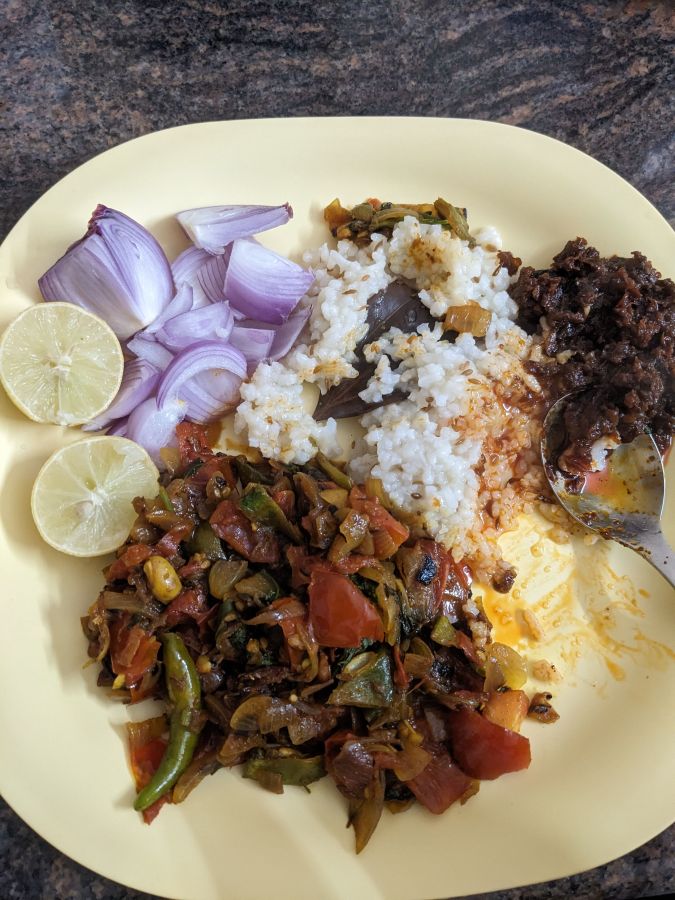
Now we were dropping down to the ground. But, as expected, we discovered the sheets grimy and dusty. I almost pulled my hair out when I discovered the mattresses and pillows to still be in their plastics. Hosts should just put straw mats in bedrooms. It is cruel to let someone hope and then snatch it away from them! Plastic-wrapped mattresses feel horrible under the back and make that zip-zip sound so particular to plastic all night. Only one bed in the hall was plastic-less. We pulled it into the centre of the hall from its dark corner, shook the existing bedsheets, making sure every crawling being could say goodbye to our bed, and put on it our sheets and pillows. Reluctantly we got our white duvet out, for it was so white and pristine that we were afraid it would be spoiled just by being out on those dusty beds.
We brushed and walked outside on the driveway, soaking in the night, our heads tilted upwards towards the large golden moon hanging above the dark green plantation. Then we went to bed. It was a little small but not so uncomfortable.
Either way, we didn’t care. We were home.
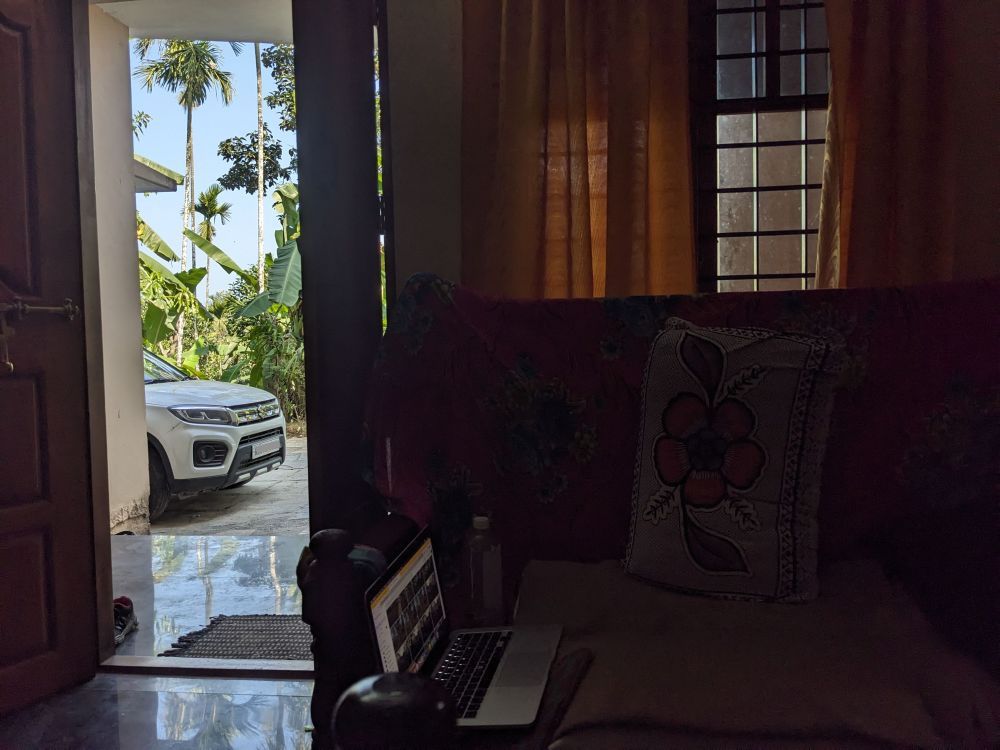
A Happy Poet From a Village of Wayanad (Kerala): Day 3, Episode 3
Two on a Trail: Day 4, Episode 4
Have you ever been homeless on the road?
*****
*****
Want similar inspiration and ideas in your inbox? Subscribe to my free weekly newsletter "Looking Inwards"!

